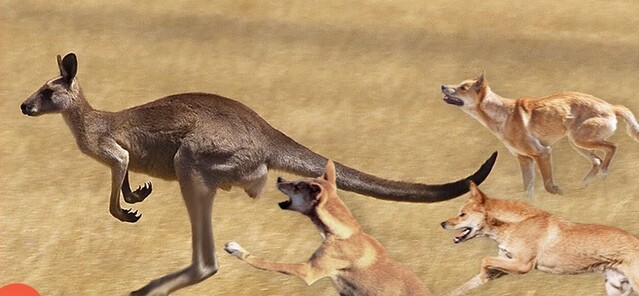Red kangaroos are one of Australia's most iconic animals, renowned for their impressive size, incredible agility, and vital role in the ecosystem. However, these fascinating marsupials face a variety of challenges in the wild, including predators, habitat changes, and human impact. This article explores the red kangaroo's predators, their defense mechanisms, and their crucial role in Australia's biodiversity.
Introduction: Who Are Red Kangaroos?
Main Predators of Red Kangaroos
Red Kangaroo Defense Mechanisms
Kicking and Fighting Back
Speed and Agility
Red Kangaroos in the Ecosystem
Herbivores in the Food Chain
Role in Australian Biodiversity
Impact of Invasive Species on Kangaroos
Feral Cats
Feral Pigs
Conservation and Population Control of Red Kangaroos
Culling and Commercial Hunting
Conservation Efforts and Sustainable Management
Fun Facts About Red Kangaroos
Conclusion: Balancing Kangaroo Protection and Predator Relationships
Red kangaroos (Macropus rufus) are the largest marsupials on Earth, with males reaching up to 8 feet in length (including their tail) and weighing up to 200 pounds. These herbivores inhabit Australia's deserts and grasslands, where they graze on grasses and shrubs. Despite their size and strength, red kangaroos face threats from both natural predators and human activities. Their survival strategies and ecological significance make them a fascinating subject for study.
Dingoes, Australia's native wild dogs, are the most prominent predators of red kangaroos. Hunting in packs, they target vulnerable individuals such as joeys, sick, or injured kangaroos. Dingoes' strategy, speed, and endurance make them a formidable threat to red kangaroos.
Domesticated dogs that have become feral also pose a danger to red kangaroos. These animals often form aggressive packs and can target younger kangaroos or adults weakened by disease or injury. Although not as skilled as dingoes, feral dogs contribute to predation pressure on kangaroo populations.

red kangaroo escaping from a dingo
Humans are significant predators of red kangaroos, both for commercial purposes (meat and leather) and as part of population control programs. While some advocate for culling to protect crops and reduce overgrazing, others raise ethical concerns about these practices.
Large raptors, such as wedge-tailed eagles, occasionally prey on joeys or smaller kangaroos. With their keen eyesight and powerful talons, these birds can target kangaroos separated from their mobs. However, they rarely pose a threat to adults.
Large pythons can constrict and consume young kangaroos, though their primary prey is often smaller animals. While not a major threat to adult kangaroos, snakes contribute to the challenges faced by joeys in the wild.
Red kangaroos use their powerful hind legs to defend themselves against predators. A single kick can cause serious injuries or even kill smaller predators. When cornered, kangaroos strike vital areas like the face or chest of their attackers.
Red kangaroos can reach speeds of 35 mph and leap over 25 feet in a single bound. These abilities allow them to escape predators by outrunning or outmaneuvering them in challenging terrain.
As herbivores, red kangaroos play a key role in controlling vegetation growth. By grazing, they prevent overgrowth and promote biodiversity in grassland and desert ecosystems.
Red kangaroos are an essential prey species for predators like dingoes and eagles. Their presence helps maintain the balance of Australia's food web, ensuring the survival of apex predators.
Feral cats are an invasive species in Australia that prey on young or injured kangaroos. These predators have significantly impacted Australia's native wildlife, including red kangaroos.
Feral pigs destroy habitats and compete with kangaroos for food, indirectly affecting kangaroo populations. Their impact highlights the broader ecological challenges posed by invasive species.
While culling is used to manage overpopulation and protect farmland, it remains controversial. Striking a balance between population control and ethical treatment is crucial.
Efforts to protect red kangaroos include habitat preservation, monitoring populations, and implementing sustainable management practices. Conservationists aim to ensure kangaroo survival while maintaining ecological balance.
Red kangaroos are the largest marsupials on Earth.
They can leap over 25 feet in a single bound.
Despite their name, not all red kangaroos are red—females often have bluish-gray fur.
Red kangaroos are a cornerstone of Australia's biodiversity, supporting predators and maintaining the balance of ecosystems. Understanding their role, predators, and challenges is key to ensuring their survival. By promoting sustainable conservation practices and addressing the impact of invasive species, we can protect these remarkable creatures for generations to come.
| Predator | Target | Hunting Strategy | Threat Level |
|---|---|---|---|
| Dingoes | Young, weak, or injured | Pack hunting, endurance | High |
| Feral Dogs | Juveniles, injured adults | Opportunistic pack hunting | Moderate |
| Humans | All ages | Hunting, culling | High |
| Birds of Prey | Joeys or small kangaroos | Aerial attacks | Low |
| Snakes | Young kangaroos | Constriction | Low |
animal tags: red-kangaroos
We created this article in conjunction with AI technology, then made sure it was fact-checked and edited by a Animals Top editor.